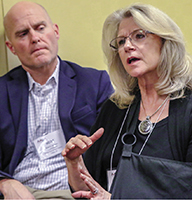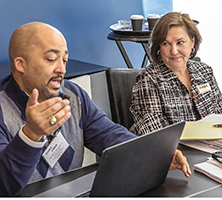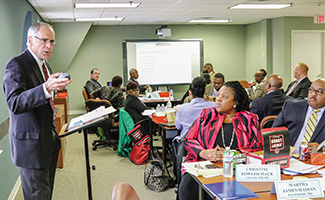Those who enter the superintendency recognize this harsh reality soon upon assuming office: You don’t know what you don’t know.
The fact is, even the best graduate programs in educational leadership or years spent working as an assistant superintendent do not fully prepare you for the unanticipated questions and conundrums that arise with regularity for those in the top berth of school system leadership.
For that reason, professional mentoring serves as a central component of the
AASA National Superintendent Certification Program®, which carries one-on-one mentoring conducted by some of the country’s most battle-tested school leaders.
School Administrator asked three of those who serve as mentors —
Gail Pletnick,
Amy Sichel and
Stephen Joel — to share a vignette about their experiences on one side or the other of a superintendent mentorship.
Feeding My Superintendent Soul
BY GAIL PLETNICK

|
Gail Pletnick, retired superintendent of Arizona’s Dysart Unified School District, with Scot Graden, superintendent in Saline, Mich., addressing an AASA Digital Consortium meeting in April in St. Louis, Mo.
|
As a new superintendent, I knew it was my responsibility to attend to the morale in my organization. Yet during challenging days when there seemed to be fires to put out every-where across the district, it made me think, who is taking responsibility for the superintendent’s morale?
The superintendent position can be as lonely as the Maytag repair person’s job. Luckily, I had mentors who always stepped up and took charge of providing the support and feedback that was necessary to feed my superintendent’s soul.
Early on in my superintendency, I had an experience that drove home how important a mentor was in the life of a superintendent. I had two school board members engage in a power struggle for control of the district’s governing board. As a new superintendent trying to build relationships with all board members, I was put in a difficult position with my “loyalty” being questioned by both individuals.
I was able to call my mentor, a former superintendent, who had experienced a similar challenge. I could share what was happening with complete trust that I was engaged in a confidential conversation. This seasoned professional did not tell me what to do or how to do it, but rather helped me reflect on my actions and decisions.
Most importantly, my mentor helped me stay balanced and focused on my core values as a leader. It was a time when I needed support to dig deeply and ensure my actions were consistent with what my beliefs and my goals were as a principled leader.
With the aid of my mentor, a difficult situation became a growth experience that enabled me to hone my skills as a communicator and negotiator.
In addition, I discovered that as hard as I tried to be the consummate professional, I was human, and the words and actions of others did impact me. During those demanding days, my mentor provided encouraging words and the emotional support needed in trying times.
I believe as a leader I grow when I am mentored, but also when I act as a mentor. So now I work to build relationships with those who can benefit from my support or coaching. Just as my wonderful mentors supported me and fed the soul of a new superintendent, I want to nurture those coming into our profession.
GAIL PLETNICK, a past president of AASA, retired from the superintendency in 2018 and resides in Glendale, Ariz. Twitter:
@gpletnick
A Ringside Coaching Seat
BY AMY F. SICHEL

|
Retired superintendent Amy Sichel, who serves as lead superintendent for the AASA’s National Superintendent Certification Program®, works with a participant at a cohort meeting in Los Angeles.
|
As a lead superintendent for the
AASA National Superintendent Certification Program®, I serve as a mentor and professional coach to Shari Camhi, superintendent of the Baldwin Union Free School District on New York’s Long Island. Shari is a seasoned educator, and I found she carried a clear vision as well as the skill set to make things happen.
She demonstrated just that as her school district embraced personalized learning and innovation. Under Shari’s leadership, the Baldwin schools diversified its range of programs to include both career and technical programs. The district also expanded its instructional program to better prepare students for college and career.
As such, our mentoring relationship would not only be about her work as a superintendent but would focus on professional growth. Shari needed to branch out beyond Baldwin and share her competencies at state and national levels. Our mentoring relationship influenced her desire to become a New York state delegate on AASA’s Governing Board and to work with the New York State Education Department on its Multiple Pathways initiative, owing to her leadership involvement in
AASA’s Redefining Ready.
My mentoring relationship with George Fiore was quite different and illustrates how a mentor can help someone think big. In June, George was appointed executive director of the Chester County Intermediate Unit in Downingtown, Pa., after a successful superintendency in Kutztown, Pa. His new position was a coveted one as executive director works collaboratively with 12 school districts across the county to provide the best services for more than 86,000 children and 6,000 educators. The annual budget is about $270 million.
Having served for just three years as the superintendent in Kutztown, George was a fairly new superintendent who’d accumulated a wealth of experience. He did so with a professional style that I found genuine and humble. I am sure others were amazed this young man was able to land such an esteemed position, but I was not.
As George’s mentor, I had a ringside seat to support him when threw his name into the ring for consideration, tackled the various interviews, created artifacts to demonstrate his skill set, worked with his intermediate agency’s board of school directors to deliver a thoughtful rationale for why this position was right for him and so forth. Being behind the scenes as George’s mentor as he prepared and landed this position made me feel like I was the coach of a team’s most valuable player.
To watch Shari spread her wings with high-level involvement on both the state and national levels and to guide George as he pursued a new professional challenge is why being a mentor benefits both sides, the mentor and the mentee. My personal satisfaction is no different than how George and Shari feel as they accomplished their professional goals and I was there as they each hit their personal grand slam.
AMY SICHEL, a past president of AASA, retired from the superintendency in 2018 and resides in Rydal, Pa.
Sometimes Good Mentoring Helps You Not Land the Job
BY STEPHEN C. JOEL

|
Lincoln, Neb., superintendent Stephen Joel (left) addresses the AASA Urban Superintendents Academy during a session at AASA headquarters in Alexandria, Va.
|
Mentoring future superintendents often conjures up lessons in the day-to-day workings of a school district: Maneuvering the nuances of a board of education, surviving the politics of a community landscape, building administrative teams, analyzing data, ensuring instruction is aligned with best practices.
Those lessons are essential, but just as often we mentor common-sense practices of preparation for a job search, effective resumes and cover letters, conducting mock interviews and — what I believe to be more important than people recognize — honing the ability to vet jobs, research possible positions and determine whether someone is the right candidate for a job. It is imperative to offer guidance in finding a job — and it is just as imperative to offer advice on avoiding the wrong job.
One favorite mentoring experience was an early one, when I was matched with a young associate superintendent in an urban school district. His superintendent was leaving the job and there was evidence of discord and conflict among existing board of education members. This young man was intent on applying for that job.
I urged caution as one always must be aware of what lies underneath the surface of a job posting. In fact, moving into a superintendent position in your own school district is one tough challenge, especially if difficult issues linger. Over the weeks, we talked through the positives and pitfalls. I suggested to him that candidates often consider a job description in isolation as opposed to taking a broader look at the complete picture and gaining a deeper understanding of the overarching school environment.
In the end, my mentee did not get the job. But of course, some of the most highly effective mentoring can be about the insights of lessons learned — lessons that lead to the discovery of a job position where one will thrive, fit perfectly and make the greatest difference.
STEPHEN JOEL is superintendent in Lincoln, Neb.